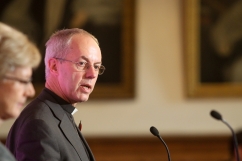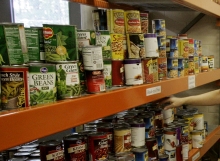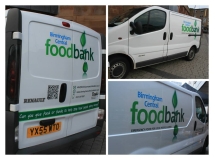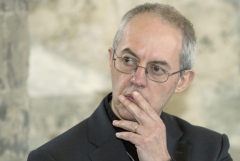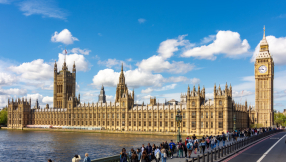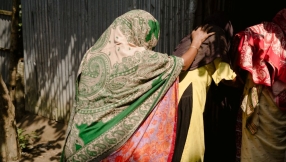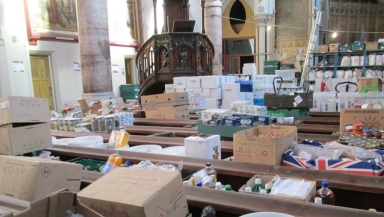
A record one million people used foodbanks in the last 12 months, according to latest figures released by the Trussell Trust today. Four in 10 of those needing help were children.
The trust, which is Britain's biggest foodbank charity, said more than 1,000,000 people received at least three days' emergency food from its foodbanks in the last 12 months, more than in any previous year.
The figure compares to 900,000 last year. The trust warned that in spite of economic recovery, the numbers of people turning to foodbanks to feed themselves and their families is continuing to grow.
Shadow work and pensions secretary Rachel Reeves told Christian Today: "It is a disgrace, it is shocking. No wonder David Cameron doesn't want to talk about foodbanks. The numbers speak for themselves."
She spoke after a day in Pudsey, a constituency next door to her own Leeds West constituency and which has a Conservative majority of just 1,600.
"It's definitely making a difference on the doorstep," she said. "I was just discussing it with one chap, who said it has gone too far. We are one of the richest countries in the world so why are people still going to foodbanks?"
Support for the work of the Trussell Trust comes from all sectors of the community, she added.
At a q & a session in Pudsey, she was told about one local business that had donated a van to a foodbank and whose staff had raised £6,000.
"People really do feel that it's wrong that anyone has to rely on charity to feed themselves. They think there should be a safety net there when they need it, and it is not there."
The growth was not about the fact that foodbanks were being advertised better, but due to greater need, she said. "We know the reasons. It is about benefit sanctions, delays in benefits, the bedroom tax, low pay, insecure work, all things that government could do something about and this government has chosen not to."
She noted that the Labour Party is the only party going into the election with a pledge to reduce the use of foodbanks. "We are lucky to have church volunteers feeding people. But in a civilised country we should not have a million people a year going to foodbanks."
The figures from the Trussell Trust show that 1,084,604 people – including 396,997 children – received three days' food from the Trussell Trust's network of more than 400 foodbanks in 2014/15, compared with 913,138 in the 2013/14 financial year. This is an increase of 19 per cent.
While problems with benefits remain the largest driver of foodbank use, there has been an increase in numbers referred due to low income in the last year.
Low income referrals increased from 20 per cent in 2013/14 to 22 per cent of all referrals in 2014/15. Foodbank managers reported that even clients who are in work are struggling with insecure work, low wages and high living costs. Benefit delays and changes have decreased from 48 per cent to 44 per cent of referrals.
Referrals to foodbanks due to sickness, homelessness, delayed wages and unemployment have increased slightly.
One recipient, Susan, a qualified teacher and mother of two children, said: "I have an 18-month-old son and an eight-year-old stepson, I work part time as a teacher and my husband has an insecure agency contract. There are times when he doesn't get enough hours of work, and we really struggle to afford food and pay the bills. The foodbank meant we could put food on the table."
Trussell Trust UK foodbank director Adrian Curtis said: "Despite welcome signs of economic recovery, hunger continues to affect significant numbers of men, women and children in the UK today. It's difficult to be sure of the full extent of the problem as Trussell Trust figures don't include people who are helped by other food charities or those who feel too ashamed to seek help."
One mum at a children's holiday lunch club said that she was skipping meals to feed her children but couldn't bring herself go to a foodbank, saying: "There are people out there more desperate than me. I've got a sofa to sell before I'll go to the food bank. It's a pride thing. You don't want people to know you're on benefits."
Adrian Curtis continued: "Trussell Trust foodbanks are increasingly hosting additional services like debt counselling and welfare advice at our foodbanks, which is helping more people out of crisis.
"The Trussell Trust's latest figures highlight how vital it is that we all work to prevent and relieve hunger in the UK. It's crucial that we listen to the experiences of people using foodbanks to truly understand the nature of the problems they face; what people who have gone hungry have to say holds the key to finding the solution."
Dr John Middleton, Vice President of the Faculty of Public Health, said: "The rising number of families and individuals who cannot afford to buy sufficient food is a public health issue that we must not ignore. For many people, it is not a question of eating well and eating healthily, it is a question of not being able to afford to eat at all. UK poverty is already creating massive health issues for people today, and if we do not tackle the root causes of food poverty now we will see it affecting future generations too. The increased burden of managing people's health will only increase if we do not address the drivers of people to foodbanks."
The Trussell Trust's foodbanks are run in partnership with churches and communities. Last year the UK public donated 10,280 tonnes of food. Nine in 10 of Trussell Trust foodbanks provide additional services alongside food to help people out of crisis for the long term.










